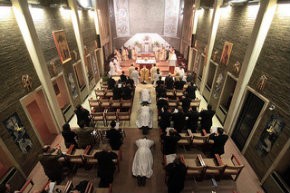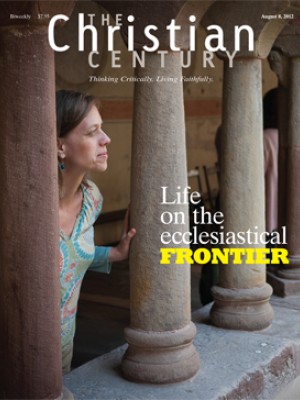Theology face down
The other day a friend of mine sent me a remarkable photograph of an ordination scene: two young men in albs lying face down, straight as arrows, hands crossed under foreheads, on an oriental rug placed before two marble steps mounting to an altar; and off to the side, a little boy in shorts imitating their posture, face down on the bare floor. To the ordinands, I imagine, it was a moment of supreme awe. To the little boy, it must have looked like naptime; yet to judge by his perfect prostration, this was naptime of a very novel and solemn sort.
If you’ve ever been present at a rite in which prostration occurs, you know what a striking impression it makes. It’s not often that one gets to see a fellow human being making an act of total self-surrender. Among Christians, the gesture is reserved mainly for life-changing events such as monastic profession, the blessing of an abbot or abbess or the conferring of Holy Orders. Ordinary laypeople are typically onlookers; yet no one can observe the act of prostration without feeling drawn in—and half-wanting to imitate to it, like the little boy in the picture. There is a powerful, built-in desire to give ourselves wholly to God. We feel that if only we could place ourselves in such a posture, everything in our muddled hearts and minds would be set right.
Read our latest issue or browse back issues.
No doubt that’s why prostration is practiced in many religions. For observant Muslims, prostration—with forehead, nose, hands, knees and toes touching the floor—recurs throughout the repeating cycle (raka’ah) of obligatory daily prayer and is the paradigm expression of worshipful submission. According to the Qur’an, God commanded all the angels to prostrate themselves before the newly created Adam. Only Iblis (Satan) refused. So God said: “O Iblis! what is your reason for not being among those who prostrated themselves?” And Iblis, who took pride in being made out of pure essential fire, replied: “I am not one to prostrate myself to man, whom thou didst create from sounding clay, from mud moulded into shape.” But it was not Adam’s clay that God wanted Iblis to worship: it was God’s creative sovereignty. Had Iblis not been blinded by pride, he would have discovered that there is joy in taking the lower position at the table, and freedom in a duly prescribed prostration, whereas to be “spiritual” is in itself of little account.
In Buddhist countries it’s not uncommon to see a form of prostration practiced by a young person in the presence of a parent, a householder in the presence of a monk, or a pilgrim in the presence of an icon or relic of the Buddha. A Tibetan friend of ours has witnessed pilgrims traveling to Lhasa inchworm style: stop, sink to knees, stretch out flat, rise to knees, stand up again, walk two steps, repeat. Rough kneepads and wooden or canvas coverings for the hands are the only concession to human frailty in this excessively punishing devotion. But the merit thus earned is said to be incalculable.
Permutations aside, all the evidence points to an essential human need to make an offering of one’s whole self—body, speech and mind, as the Buddhists put it. The phenomenon I am trying to describe is wholly different from a groveling self-abasement. When carried out under the right conditions and with the proper object, there is a dignity to this posture; it edifies and orients rather than submerging the individual personality and will. But it is also a check against pride, and in the realm of intellectual endeavor—I am thinking especially of academic theology—the sense of placing oneself wholly at God’s disposal could be a game-changer.
When one is face down on the ground, it is difficult to think of promoting one’s own agenda. To think with the mind of the church comes naturally in this position. Theologians who are prostrate (metaphorically, if you will) on the floor of the church are more likely to hesitate before constructing proposals to sweep away the common testimony of the centuries, the quod semper, quod ubique, quod ab omnibus, or the guidance of authorities, in favor of exciting but untested ideas. I begin to imagine a peaceable kingdom in which theologians and bishops lie down together on the same floor, the lion with the lamb.
I suppose this is a variant of Hans Urs von Balthasar’s idea of “theology on the knees.” And it is true that lying flat on the ground is not, for most Christians, an appropriate posture for prayer; ordinarily, we stand or kneel, and each of these postures has a rich symbolism of its own. But there is something about the image of prostration that evokes the essential gestalt of Christianity: to pray, in union with Christ, “not my will, but Thy will be done.” Until we understand prostration and hear its echo in our hearts, we will misread the creative tension that must always characterize the theologian’s service, and we will fall too easily into clichés about the oppressive hierarchical church.






